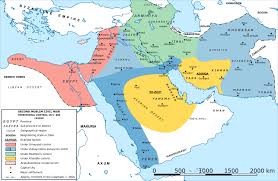Description:
The Battle of Karbala: A Profound Testament to Courage, Sacrifice, and Justice | Islamic History
The Battle of Karbala, fought on the 10th of Muharram in 680 AD, is a pivotal moment in Islamic history. It is led by Imam Hussain (AS), Prophet Muhammad’s grandson, and represents steadfast fortitude, sacrifice, and the pursuit of justice in the face of injustice. Despite being massively outnumbered, Hussain and his companions chose martyrdom over capitulation, establishing a legacy that continues to inspire future generations.
Introduction: The Significance of the Battle of Karbala
The Battle of Karbala, fought on the 10th of Muharram in 680 AD, is one of the most poignant and defining events in Islamic history. This tragic yet heroic event is marked by the unwavering courage, profound sacrifice, and steadfast pursuit of justice by Imam Hussain (AS), the grandson of Prophet Muhammad (PBUH), and his companions. The battle is not just a historical event; it is a powerful symbol of resistance against tyranny and oppression, embodying values that resonate across time and cultures.
The Historical Context of the Battle of Karbala

The Battle of Karbala took place during a period of significant political turmoil within the Islamic world. After the passing of Prophet Muhammad (PBUH), the leadership of the Muslim community saw various challenges and conflicts. Yazid, the son of Muawiya and the ruler of the Umayyad Caliphate, sought to consolidate his power by demanding allegiance from prominent figures, including Imam Hussain (AS). However, Hussain’s refusal to pledge allegiance to Yazid, whom he viewed as an unjust ruler, set the stage for the fateful battle.

Janum Ali Ali | Nadeem Sarwar | 2023 / 1445
Courage in the Face of Adversity

Nadeem Sarwar | Azadar | 2018 / 1440
Imam Hussain (AS) and his small group of family members and followers demonstrated unparalleled courage as they faced the overwhelming forces of Yazid’s army. Despite being vastly outnumbered, Hussain and his companions stood firm in their resolve to uphold the principles of Islam. Their courage was not just in facing certain death but in their steadfast commitment to truth and justice. The Battle of Karbala, therefore, serves as a powerful reminder that true bravery lies in standing up for what is right, even in the face of insurmountable odds.
The Ultimate Sacrifice for Justice

The sacrifice made by Imam Hussain (AS) and his supporters is the most moving part of the Battle of Karbala. Hussain’s determination to confront Yazid’s armies, despite knowing the eventual outcome, stemmed from his strong feeling of responsibility to Islam and the Muslim community. Hussain’s sacrifice, along with that of his family and comrades, demonstrates the costly cost of maintaining justice. Their sacrifices have become a symbol of resistance to tyranny, motivating future generations to combat oppression.
Nadeem Sarwar | Badshah Hussain | 2016
The Lasting Impact of the Battle of Karbala
The Battle of Karbala made an indelible impact on Islamic history and continues to inspire millions all over the world. It is honored yearly during the month of Muharram, notably on Ashura Day, with mourning rituals and meetings to reflect on the battle’s lessons. The event crosses religious and cultural barriers, instilling universal ideals like courage, sacrifice, and the unwavering quest of justice.
Conclusion: The Legacy of Karbala in Modern Times
The Battle of Karbala is more than simply a historical event; it teaches a timeless lesson about courage, sacrifice, and justice. Its legacy continues to inspire people who strive to combat injustice and oppression throughout the globe today. As we reflect on the events of Karbala, we are reminded of how powerful a dedication to truth and justice can be, especially in the face of enormous hardship.
